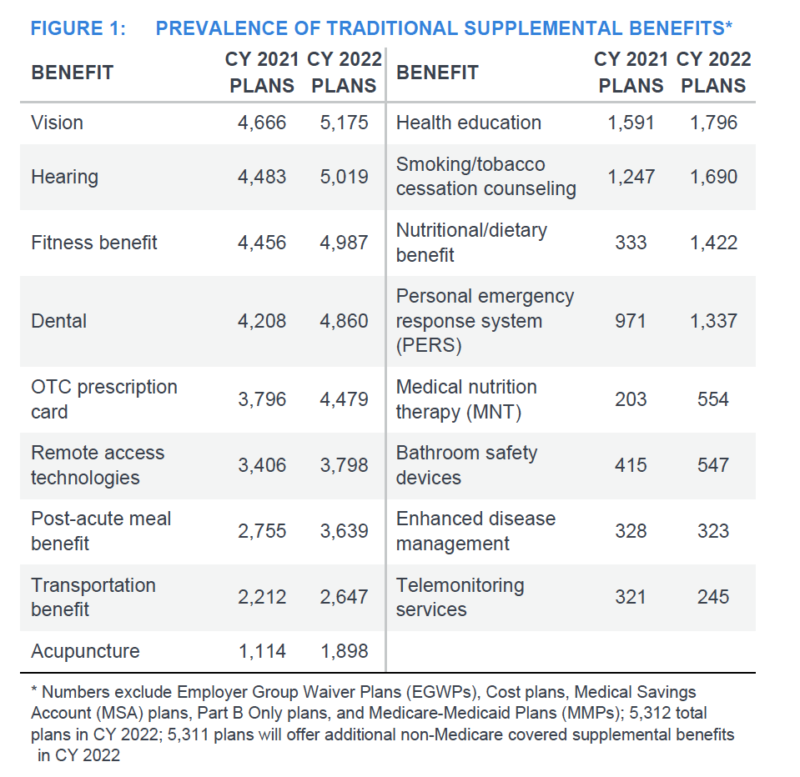Study: 99.9% of Medicare Advantage Plans Offering Supplemental Benefits in 2022
Supplemental benefit offerings increase across 35 of 41 categories for 2022, including a 38% jump in SSBCI benefits, as BMA’s Donahue notes “Medicare Advantage’s value to beneficiaries has never been clearer”

Washington, D.C. – As the Centers for Medicare & Medicaid Services (CMS) prepares its final 2023 Medicare Advantage rate announcement, a new issue brief prepared by the actuarial consulting firm Milliman examines the wide array of supplemental benefits offered to Medicare Advantage beneficiaries this year.
From 2021 to 2022, the number of Medicare Advantage health plans offering supplemental benefits grew in 35 out of 41 categories measured, including 15 out of 17 traditional supplemental benefit categories, 4 out of 5 expanded supplemental benefit categories, and 16 out of 19 Special Supplemental Benefits for the Chronically Ill (SSBCI) categories. Benefits that are most widely offered in Medicare Advantage include vision (offered by 97% of plans), hearing (94%), fitness (94%), and dental care (91%).
Moreover, 84% of plans offer over-the-counter benefits, while 69% provide a meal benefit and 50% include transportation benefits.
Milliman’s findings indicate that 5,311 of 5,312 Medicare Advantage plans (99.9%) will offer supplemental benefits unavailable in fee-for-service Medicare for 2022.
Among Special Supplemental Benefits for the Chronically Ill (SSBCI) – a subset of Medicare Advantage benefits made available beginning in 2018 to support beneficiaries with certain chronic conditions – food and produce and meals (beyond a limited basis) were the most widely offered benefits, reaching eligible chronically ill beneficiaries in plans with more than 2.9 million and 1.9 million total beneficiaries, respectively. Overall, the number of Medicare Advantage plans offering SSBCI benefits jumped 38% from 2021 to 2022 (815 plans to 1,127).
Milliman’s analysis also examines the clinical conditions for which Medicare Advantage plans most frequently offered SSBCI benefits. Beneficiaries with diabetes were the most targeted population for these extra benefits, followed by congestive heart failure and chronic obstructive pulmonary disease (COPD).
“As this analysis shows, Medicare Advantage continues to raise the bar in supplemental benefits offered to seniors. In fact, 99.9% of Medicare Advantage plans offer one or more of these supplemental benefits for 2022, as benefits like vision, hearing, fitness and dental coverage become nearly universal across Medicare Advantage plans. What’s more, this analysis showed continued growth in benefits like over-the-counter coverage, remote access technologies, and meals that are helping seniors weather the COVID-19 pandemic,” said Mary Beth Donahue, President and CEO of the Better Medicare Alliance. “With SSBCI benefits increasing 38% and health plans providing everything from prescription pickup, to service dog support, to structural home modifications, Medicare Advantage’s value to beneficiaries has never been clearer.”
“Medicare Advantage’s value-based framework continues to spur more benefit offerings that are helping seniors manage disease progression and live with dignity and independence,” said A. Mark Fendrick, MD, Director of the University of Michigan’s Center for Value-Based Insurance Design and Member of Better Medicare Alliance’s Council of Scholars. “This wellspring of benefit offerings gives further credence to Medicare Advantage’s role as a leader in addressing social determinants and offer lessons on how we might improve patient-centered outcomes, enhance equity, and increase efficiency of health care spending.”
“When it comes to access to care, communities of color face unique health risks, continuing disparities, and barriers to care. Specifically, HHS data shows that AANHPI communities are at acute risk for conditions such as diabetes, certain cancers and Hepatitis B. APIAHF welcomes this research showing the ways that Medicare Advantage is targeting benefits for so many of our communities populations while continuing to grow supplemental benefit offerings across the board. We urge policymakers to protect the stable rate environment and flexible benefit structure that makes these advances for all beneficiaries, including immigrant populations, possible,” said Juliet K. Choi, President and CEO of Asian & Pacific Islander American Health Forum (APIAHF).
“At agilon health, the frontline health care providers we partner with across the nation see the value of these benefits in Medicare Advantage with their own eyes. We celebrate the continued expansion of supplemental benefits in Medicare Advantage that will enhance care for many of the diverse beneficiaries our primary care physician partners serve,” said Ben Kornitzer, MD, Chief Medical and Quality Officer at agilon health.
Read the full issue brief from Milliman HERE.
###
